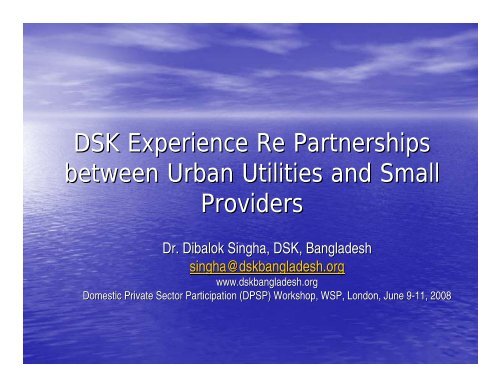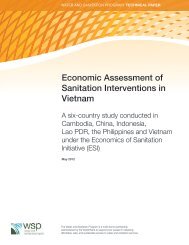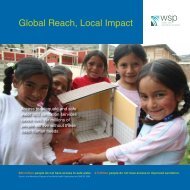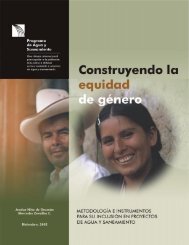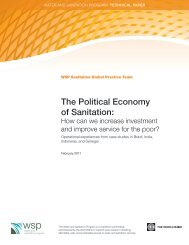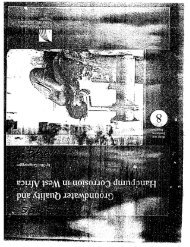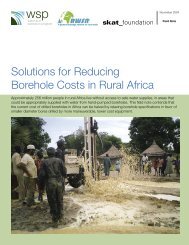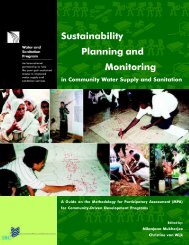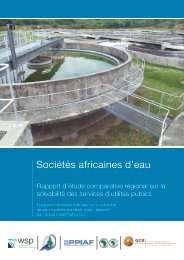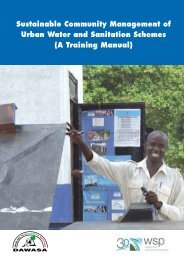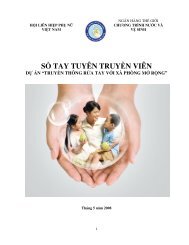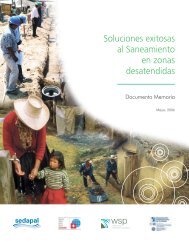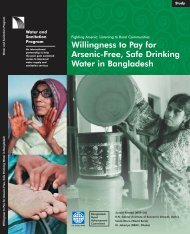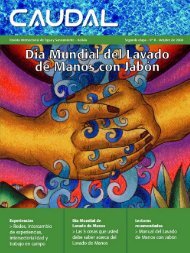DSK Experience Re Partnerships between Urban Utilities ... - WSP
DSK Experience Re Partnerships between Urban Utilities ... - WSP
DSK Experience Re Partnerships between Urban Utilities ... - WSP
You also want an ePaper? Increase the reach of your titles
YUMPU automatically turns print PDFs into web optimized ePapers that Google loves.
<strong>DSK</strong> <strong>Experience</strong> <strong>Re</strong> <strong>Partnerships</strong><br />
<strong>between</strong> <strong>Urban</strong> <strong>Utilities</strong> and Small<br />
Providers<br />
Dr. Dibalok Singha, <strong>DSK</strong>, Bangladesh<br />
singha@dskbangladesh.org<br />
www.dskbangladesh.org<br />
Domestic Private Sector Participation (DPSP) Workshop, <strong>WSP</strong>, London, on, June 9-11, 9<br />
2008
Discussion Topics<br />
The Setting<br />
<strong>Urban</strong> Context and Challenges<br />
Journey with DWASA<br />
– <strong>DSK</strong> Water Point<br />
– Chronology of events<br />
– Contract with DWASA<br />
• Outcomes
The setting<br />
• Bangladesh in S Asia<br />
• Population >140 million<br />
• Bangladesh a country<br />
projected to have more<br />
than fifty percent of its<br />
population in urban<br />
areas by 2030<br />
• Factors contributing to<br />
<strong>Urban</strong>ization: Rural to<br />
<strong>Urban</strong> Migration,<strong>Urban</strong><br />
population Growth,<br />
Geographic Increase of<br />
Territories<br />
Dhaka a mega city
The setting<br />
• Dhaka a mega city with a<br />
population of 12.5 million.<br />
• About Three million<br />
people are living in slums<br />
of Dhaka.<br />
• Communities willing to<br />
pay for water and<br />
Sanitation.<br />
• Private vendors charge<br />
extraordinary high rates<br />
for water<br />
• Often slum dwellers do<br />
not have legal water<br />
sanitation services in<br />
slums.<br />
Dhaka City Map
Start of a Journey with DWASA<br />
• 1991<br />
– Community members contacts <strong>DSK</strong> for water service<br />
– <strong>DSK</strong> tries with STW however met with failures<br />
• <strong>DSK</strong> Enters into a contact with DWASA<br />
• 1992<br />
– DWASA grants two water points on an exceptional<br />
basis<br />
– Installation of water point in one of the slums at<br />
Tezgaon in Dhaka<br />
– DWASA fixes social rates for water<br />
– Bulk metering
<strong>DSK</strong> Water Point<br />
• Provision of water services<br />
via water points connected<br />
to DWASA mains<br />
• Women participation and<br />
Leadership<br />
• CBO’s are the agents for<br />
success<br />
• Behavioral change<br />
communication<br />
• Social and Financial<br />
Sustainability of the project<br />
• Strategic engagement with<br />
LGIs<br />
• NGO intermediation
Chronology of Events<br />
• 1992<br />
– DWASA allowed <strong>DSK</strong> to install two water points on an exceptional<br />
basis.<br />
• Since 1996<br />
– DWASA agreed to continue such collaboration on case to case<br />
basis;<br />
• <strong>WSP</strong> supports scaling up of the approach, Water Aid joins<br />
hand<br />
• 1998 National Drinking water Policy of GoB recognized<br />
above as possible modality of operation to provide access<br />
of urban poor to water and sanitation services.<br />
• 1999 DWASA MD through a public TV interview highlighted<br />
and appreciated importance of <strong>DSK</strong> model.<br />
• <strong>Re</strong>plication of <strong>DSK</strong> model through other NGOs starts<br />
• 2005<br />
– DWASA signs a MoU with NGOs<br />
• 2007<br />
– DWASA Gazette
Outcomes<br />
• From exceptional provision of water points to Legal<br />
provisions<br />
– Water service at the door step of the urban poor<br />
• Water connection to Slums is legal<br />
– Individual meters<br />
– Decrease of cost for end users<br />
– Social rates<br />
– Women water point management committees<br />
• Institutional Change at DWASA<br />
– <strong>Re</strong>cognition of Slum Dwellers as legal clients<br />
– Ownership of land overruled<br />
– <strong>Re</strong>cognition of NGO intermediation<br />
– DWASA Mou with NGOs in 2005<br />
– DWASA Gazette, December, 2007 In relation to Sanitation may in a<br />
position to charge less than social rates<br />
– CBO/NGO/INGO/any other social organizations are eligible to set<br />
up water supply service<br />
• and collect fees in that relation.


